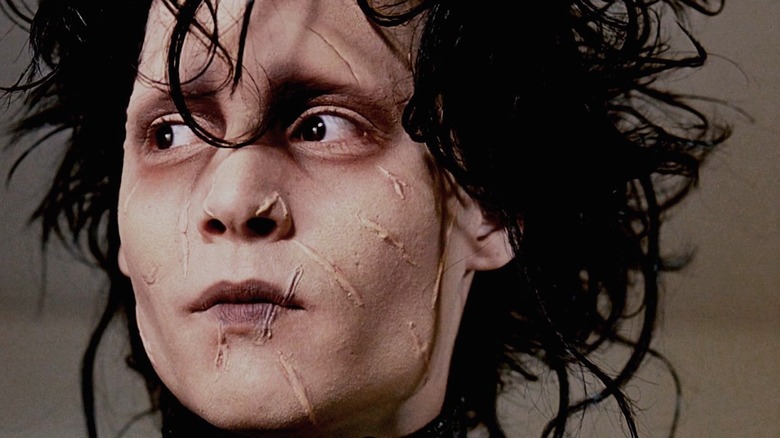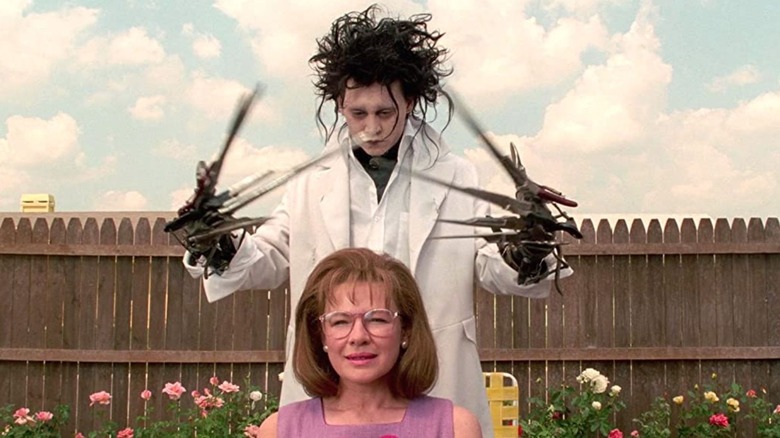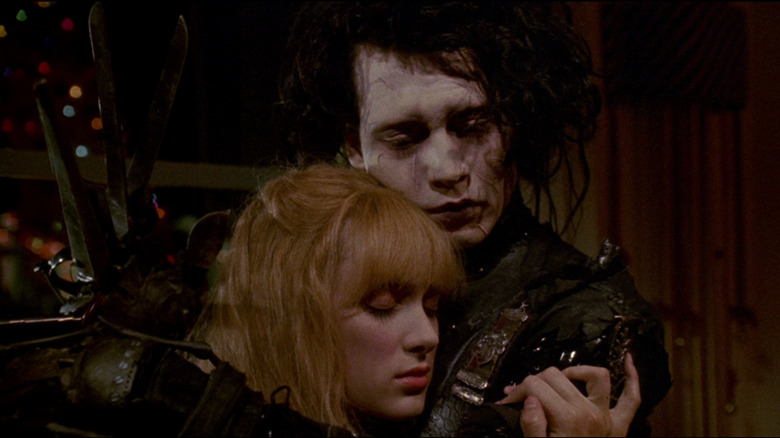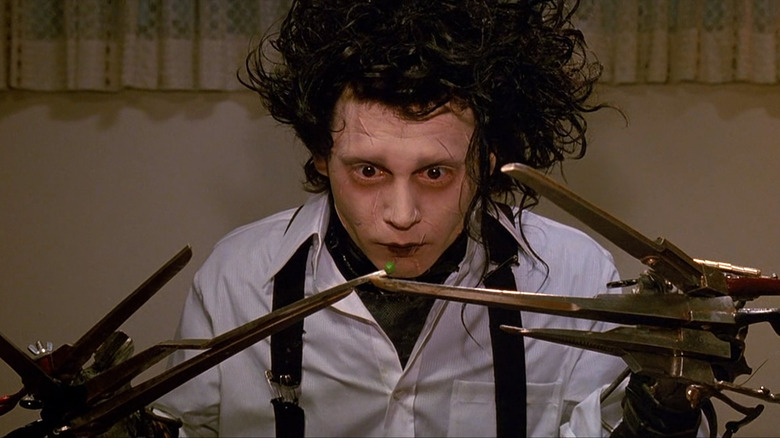The Inescapable Feeling That Inspired Tim Burton To Make Edward Scissorhands
I can pinpoint the exact moment when I gave up on Tim Burton. It was during that big battle scene at the end of "Planet of the Apes," when Marky Mark is saved from death at the hands of an evil talking monkey by... a cute chimp in a spacesuit.
I don't know exactly what kind of reaction Burton thought that moment might elicit from an audience; there just aren't many dramatic or thrilling movie situations that have been heightened or satisfyingly resolved by the unexpected arrival of a cheeky primate, especially during the climactic showdown between the hero and villain. I know "Planet of the Apes" kind of sets up the chimp thing earlier in the movie, but seriously? In the screening I attended, it provoked a loud mixture of guffaws and groans. By the time the critically reviled "twist" ending arrived, the crowd was almost ready to riot.
The crazy thing is, the chimp situation isn't even the worst thing Tim Burton has done in the 21st century. But it was the moment when I started seeing his movies through different eyes. Before that, I was totally willing to forgive any blips or errors of judgement ("Mars Attacks!") for the unconfined joy that many of his earlier films gave me. I have even tolerated Tim Burton movies since that plucky chimp with the right stuff blasted into the fray like a simia ex machina (if you'll forgive my Google Latin). "Big Fish" is a bit of a mess, but I find the ending almost overwhelmingly moving; I even have a slight soft spot for "Charlie and the Chocolate Factory," which has become a guilty pleasure after seeing it several times with the kids.
Otherwise, the magic has gone, and that makes me sad. There is no question that Burton was one of the most unique and instantly recognizable directors Hollywood has produced in the past 40 years, and he made two of my favorite films: "Ed Wood," and the movie that first introduced me to his strange world, "Edward Scissorhands."
So what happens in Edward Scissorhands again?
Burton's modern fairytale tells the story of Edward (Johnny Depp), a pale young man built by a childless inventor (Vincent Price). Unfortunately, the old man dies before he can put the finishing touches to his creation, leaving Edward alone with razor sharp scissor blades for fingers.
Years later, cheerful Avon lady Peg Boggs (Dianne Wiest) arrives at the door of Edward's home, a spooky gothic mansion looming over her candy-colored suburban neighborhood below. Realizing Edward is an orphan, she wastes no time taking him home to live with her and family, including her laidback husband Bill (Alan Arkin) and teenage daughter Kim (Winona Ryder).
While Edward has difficulty with basic things like eating a roast dinner and sleeping in a water bed, he has other talents that quickly make him the toast of the neighborhood. However, as his feelings for Kim grow and her jock boyfriend (Anthony Michael Hall) takes advantage of his naivety, the resident's fear of the outsider gets out of hand...
For much of his career, Burton's films have focused on peculiar loners; the childlike Pee-wee Herman, the Dark Knight, and even the ultimate real-life Hollywood outsider, Edward D. Wood Jr. It's a recurring theme, but even the strongest of those movies lack the tender, semi-autobiographical feeling of "Edward Scissorhands." There is clearly something of the director in the awkward goth figure of Edward, including a similar unkempt mop of black hair and favored dark clothing that the filmmaker frequently wore.
The young Burton grew up feeling like ill at ease with his sunny neighborhood in Burbank, California, hanging around in graveyards and sitting indoors watching classic horror movies while the other kids were enjoying more outdoor pursuits (via Vox). As a keen artist, he drew a young man with scissors for hands. It was a character he identified with, and it eventually became one of his most beloved creations. That's when he needed another sensitive soul to play the part...
Burton and Depp: Kindred spirits
"Edward Scissorhands" was Burton's fourth feature film and first starring Depp, who quickly became his muse. He has starred in a further seven of the director's movies to date. The film helped make 1990 a big breakthrough year for the young actor, sending up his heartthrob image in John Waters' delirious 1950s musical pastiche "Cry-Baby" and proving inspired casting as Edward. From the early stages of his film career, it was clear that he was more comfortable playing outsiders, which was perfect for Burton:
"When we were looking to cast that part, I was looking for somebody who got the idea, that sadness, of being mis-perceived... you look to actors in their eyes and, you know, he's got those kind of eyes that can say things without speaking."
As Burton later reiterated in a conversation with The Guardian:
"I knew right from the beginning that Johnny got it. Yes, he looks the way he looks, but as a person he's much more like these other characters, and that's what I love about him. The worse you make him look, the better he feels, which is not what the studios want to hear but it makes him happy."
Depp was also enamored with the part of Edward, as he said in an "Edwards Scissorhands" special airing on TV:
"I can remember reading the script and – it's embarrassing – weeping. I mean I cried, you know, I read the thing and I cried. I thought it was one of the most beautiful things I'd ever read in my life."
Their collaborations have lost some of the shine, thanks to over-familiarity, perhaps reaching the nadir in Depp's irritating bag of character tics in "Alice in Wonderland." Yet they clearly had a mutual joy of working with one another, which was most evident in their earlier films — "Scissorhands," "Ed Wood," and "Sleepy Hollow" — all of which displayed that unmistakeable energy of two kindred spirits working together.
Loneliness is the inspiration for Edward Scissorhands
The visual metaphor of having sharp blades for hands is so beautifully simple, and it gives "Edward Scissorhands" a fable-like quality, even if the day-to-day practicalities of Edward's situation meant Tom Cruise talked his way out of the part. Edward yearns to reach out, to embrace his new family, and to be loved, but he literally can't do so without the risk of causing serious lacerations.
The autobiographical nature of the film ties into Burton's alienated childhood, where he grew up feeling at odds with his urbane, sunny surroundings. It's a feeling that inspired and informed every aspect of Edward's character. As he told The Guardian:
"[The story] was based on a feeling of touching and communication and... I've gotten better at all that, but if you're lonely, you can grow up and have 20 million friends and be Mr Touchy-Feely... but you still have that feeling because it doesn't leave you. So I think it's those things you think you're exorcising, but you don't, really."
Many people experience similar feelings of isolation when they are younger, and growing up can be very lonely at times. As a teen, I had a happy time in high school with a solid group of friends. Then I moved up to Sixth Form, where I suddenly had to deal with an influx of new classmates from other schools, and I totally clammed up. I was barely able to speak in front of the newcomers, and it was a real source of pain and frustration for me. Almost everyone can see aspects of themselves in the lonely romantic figure of Edward, which may explain why "Edward Scissorhands" remains one of Burton's most enduringly popular films.



